Continuing his study of contemporary Iran, Thierry Meyssan shows how Tehran has once again abandoned the anti-imperialist ideal of the 1979 revolution to return to its imperialist policy. This article, like the previous one, presents many unknown elements. It continues with an astonishing hypothesis.
This article is a follow-up to :
"Imperialist Iran Becomes Anti-Imperialist," by Thierry Meyssan, Voltaire Network, August 4, 2020.
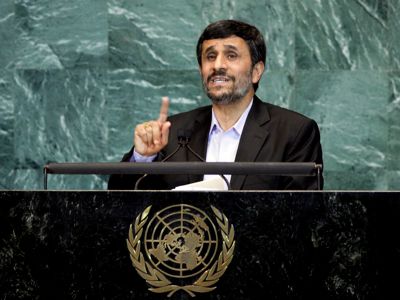
The youth that had shed its blood for the country was coming of age. Mahmoud Ahmadinejad, then 51, a former officer in the Revolutionary Guard Special Forces, was elected president. Like Khomeini, he had a conflictual relationship with the clergy, especially since the clergy had only protected only its own children during the war. He intended to resume the fight against injustice and modernize the country. An engineer by training and a professor of technology, he endowed Iran with an efficient industry. He undertook a vast construction programme throughout the country to put an end to the shantytowns. At the international level, he allied himself with the Venezuelan Hugo Chávez and the Syrian Bashar el-Assad to challenge Western imperialism. These three countries suddenly became the centre of the international diplomatic game with the discreet support of the Holy See.
Despite the painful memory of the war imposed on Iran by Iraq, Ahmadinejad helped the Iraqi Resistance to the US aggression, without distinguishing between Sunnis and Shiites, and then the Syrian Resistance against the jihadists. But he came into conflict with his own Iranian allies firstly because of his commitment to the Iraqi Sunnis and Syrian secularists, then because he attached more importance to ancient Iran than to the Islamic era, and finally when he tried to allow the shaving of beards and to make the Islamic veil optional. He then directly threatened the power of the clergy and the Guide of the Revolution, Ayatollah Ali Khamenei. At the time of his re-election, Khatami and a son of Rafsanjani organized with the CIA an uprising of the bourgeoisie of Tehran and Esfahan. But the little people came to his rescue and the "green revolution" failed.
His enemies abroad accuse him of being an anti-Semitic dictator, wanting to wipe the Israelis off the map; his Iranian allies insult him and made a mockery of his mysticism. In reality, he denounced the almighty power of the Guide and even "went on strike" against the presidency.
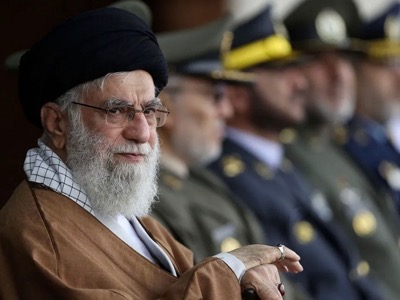
In March 2013, Ali Khamenei sent a delegation to Oman to hold secret talks with the United States. President Barack Obama intended to pursue the Rumsfeld/Cebrowski strategy of destroying state structures in the "Greater Middle East", but he did not wish to drive his troops into this quagmire as his predecessor George Bush had done in Iraq. He was therefore in favour of a division of the Muslim community into Sunnis and Shiites. His diplomats therefore declared to the Guide’s envoys that they were ready to let him organise a "Shiite crescent" and to compete with the Sunni Saudis. The Guide’s representative, Ali Akbar Velayati, sees this as an opportunity to re-establish the Safavid empire. Unbeknownst to certain other members of the delegation, he made a commitment to eliminate Ahmadinejad’s men and to favour Sheikh Hassan Rohani who was the first contact with Israel and the United States during the Iran-Contra affair.
Indeed, the Council of Guardians of the Constitution declared Ahmadinejad’s candidate, Esfandiar Rahim Mashaei, a "bad Muslim" and forbade him to run for the presidential election. The Guide favoured several candidates who shared the votes of the revolutionaries, while the pro-Westerners presented only Rohani. Rohani was therefore elected. He took as Minister of Foreign Affairs Mohammad Javad Zarif who had spent most of his life in the United States.

The new team publicly negotiated, with the five permanent members of the Security Council and Germany, an end to the nuclear controversy. The Shah had begun a military atomic research programme that Iran had first pursued during the war imposed by Iraq and finally abandoned when Imam Khomeini opposed weapons of mass destruction. However, Ahmadinejad had taken over elements of this programme, this time for civilian purposes. Israel had then intoxicated the international press by claiming that Iran was looking for a way to continue the Shoah, not hesitating to falsify the translation of Ahmadinejad’s speeches. The major powers knew that this was not true, so a façade agreement was quickly reached in Geneva, but it was not signed. For a year, Mohammad Javad Zarif and Secretary of State John Kerry secretly negotiated the division of the Greater Middle East. It was only after a secret protocol was signed in 2015 that the other negotiators were invited to formalise the previously agreed accord in Lausanne and then to sign it in Vienna. Disputes between Tehran and Washington were unblocked. The sanctions were gradually lifted, prisoners on both sides were released and a first instalment of 1.3 billion dollars in cash was discreetly flown into Iran.
However, while the families of the Rohani team were leading a lavish lifestyle, they were not doing much for the people, who were increasingly suffering from the economic situation. It is true that Western economic sanctions were hindering the country’s development, but that does not explain the situation: as an expert in international trade, Iran hadd created a vast system of intermediaries around Dubai to mask the origin and destination of its products. It is impossible for the US to control the land borders that Iran has with eight countries and its maritime borders.
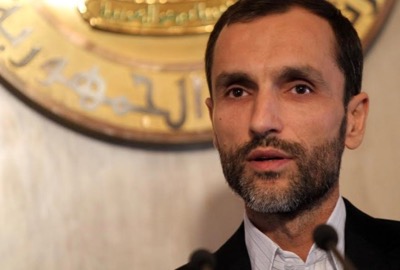
In 2017, the Council of Guardians of the Constitution declared Ahmadinejad’s new presidential candidate, Hamid Baghaie, a "bad Muslim" and banned him from running. Sheikh Rohani was elected for a second term, but former president Mahmoud Ahmadinejad revealed the malfeasance of the government and the Guide. Demonstrations against both the president and the Guide multiplied. The authorities placed Ahmadinejad under house arrest for a while and arrested his entire entourage one by one. Esfandiar Rahim Mashaei, who had represented him in the 2013 elections, was sentenced to six and a half years in prison for "plotting against the Islamic Republic". Hamid Baghaie, who represented him in the 2017 elections, was sentenced to 15 years in prison after a secret trial of which nothing is known, not even the grounds for prosecution.
The government then published a document proposing the creation of a Shiite federation including Lebanon, Syria, Iraq, Iran and Azerbaijan, under the authority of the Revolutionary Leader, Ayatollah Ali Khamenei. It is nothing more and nothing less than the re-establishment of the Safavid empire. In Syria, the Revolutionary Guards ceased to defend the country and devoted themselves solely to protecting the Shiites.
In a few years, anti-imperialist Iran has transformed itself into a new imperialist power. Its own allies have become paralysed, not knowing how to escape from the trap into which they have fallen.
Iran’s actions do not correspond at all to its rhetoric, which masks its strategy. Westerners are wrongly persuaded that this country is violently anti-American. This is absolutely false: the governments of the Shah, Rafsanjani, Khatami and Rohani were entirely turned towards Washington. The embassy hostage affair (1979-81) is an invention: they were not hostages, but diplomats arrested in flagrante delicto for spying. Moreover, the United States never sought redress under the Vienna Convention on Diplomatic Personnel. As for the anti-imperialist camp, it is by definition against imperialism and not against the United States. Ahmadinejad wrote to Donald Trump to encourage him to carry out the clean-up of his administration that he had promised to carry out during his election campaign.
Identically, Iran is not against the Jews. True, there is genuine anti-Semitism among a fraction of the population, but it was Emperor Cyrus who freed the Jews from their captivity in Babylon, and since then Iran has always protected them. While they insult each other in public and hack into their computer systems, Israel and Iran have never waged war on each other. Today, they even jointly operate the Ashkelon-Haifa pipeline, in the heart of the Jewish state; a reality that it is forbidden to mention in the Israeli press under penalty of 15 years in prison.
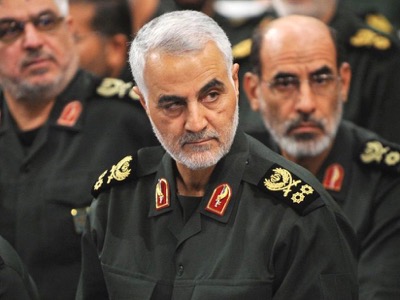
Disoriented by Hillary Clinton’s failure in the US presidential election and Donald Trump’s victory, Iran hopes that he will be removed from office soon. Sheikh Rohani therefore refuses to speak to him. Opposing the Rumsfeld/Cebrowski strategy, Donald Trump urged the Sunni camp to stop its support for terrorist groups during his speech in Riyadh and withdrew his country from the Vienna agreement with the Shiite camp. While the Saudis are adjusting to the new White House tenant, Rohani’s team persists in ignoring him. The only agreement that can be reached between Iran and both the White House and the Pentagon is to put an end to the Revolutionary Guards, Hezbollah, and all forms of contestation of Western domination, and then to divide the Muslim community in two to prevent the resurgence of the revolution.
Finally, Donald Trump asserted his authority in the region by assassinating, a few weeks apart, the main Sunni military leader, Caliph Abu Bakr al-Baghdadi, and the main Shiite military leader, General Qassem Soleimani.
Sheikh Rohani then resolved to negotiate with Donald Trump. In March 2020, he coordinated the Houthis’ action with that of the Emiratis against the Saudis in Yemen; in May, he accepted that one of Soleimani’s assassins, Mustafa al-Kadhimi, would become Prime Minister in Iraq and, in June, he sent Revolutionary Guards to fight alongside NATO in Libya as his mentor Rafsanjani had once done in Bosnia-Herzegovina. At the same time, he accepted China’s offer to buy its oil at 70% of the market price, which will once again guarantee him oil revenues, but questions his alliance with India. India plans to channel Indian trade to Afghanistan through the Iranian port of Chabahar, bypassing Pakistan. However, historical logic would have it that Tehran should be integrated into the Chinese Silk Road project, which was also its own in Antiquity and the Middle Ages, and thus form an alliance with Pakistan.
The history of contemporary Iran can be summed up as an inexorable swing between two political visions: either the greatness of an empire based on the legacy of the Prophet Mohammed, or the struggle for justice based on the example of his life and those of the Prophets Ali and Hussein. The first faction is referred to by the Western press as the "moderates" (sic), the second as the "conservatives" (re-sic).
Hypothesis
The rest of this article is obviously to be taken with caution since it is only a hypothesis. But it deserves some thought.
It must be noted that the death of General Qassem Soleimani, commander of the Revolutionary Guard Special Forces, was a blessing for Hassan Rohani. Not only did it not produce a proportionate response, but one of his assassins became Prime Minister of Iraq with the support of Sheikh Rohani. By appointing an illustrious unknown to succeed him, the Iranian authorities themselves neutralized the Revolutionary Guard Corps. Logic would therefore suggest that the next personality to be eliminated from the landscape would be the Secretary General of Hezbollah, the Lebanese Hassan Nasrallah.
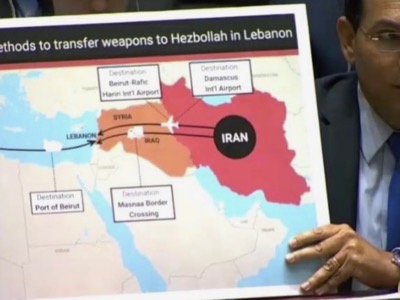
However, this is not what we have just witnessed in Beirut: a Hezbollah unloading warehouse was hit by a new weapon and exploded. More than 150 people were killed and 5,000 injured. Only Israeli voices, such as MP Moshe Feiglin, and Iranian ones assured the next day that all misfortune is good. For the official press in Tehran, the destruction of the port of Beirut will increase the activity of the Tehran-Baghdad-Damascus-Beirut land route, thus the project of a Shiite federation.
On August 6, French President Emmanuel Macron visited the site. According to his interlocutors, he gave the Lebanese leaders three weeks to implement the second part of Resolution 1551, i.e. to disarm the Resistance. On August 7, Hassan Nasrallah intervened on al-Manar, troubled, uncomfortable, even depressed. He denied four times that he was involved in any way in the port of Beirut.
But the machine is running. The first part of resolution 1551 provided for the ousting of the Syrian peace force that ended the Lebanese civil war. It was followed in 2005 by the assassination of former Prime Minister Rafik Hariri and the "Cedar Revolution". The second part, the disarmament of Hezbollah, will be achieved in 2020 with the destruction of half of Beirut and a new colour revolution. All this is the business of the old accomplices since the Iran-Contra affair, Benjamin Netanyahu and Hassan Rohani.

 Articles by this author
Articles by this author Send a message
Send a message











Stay In Touch
Follow us on social networks
Subscribe to weekly newsletter